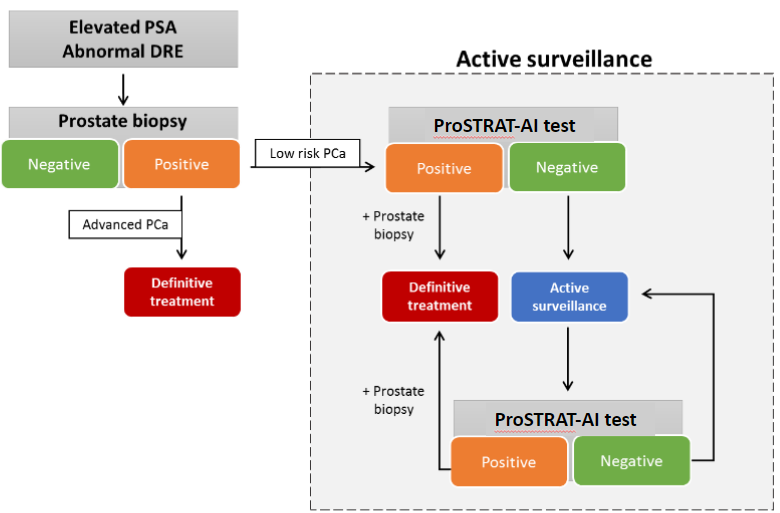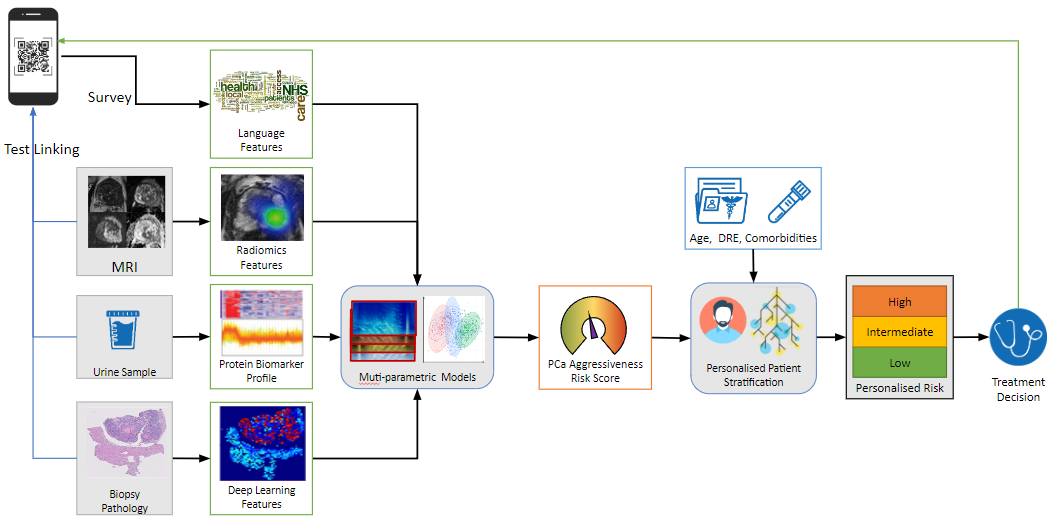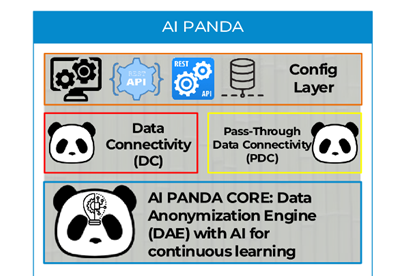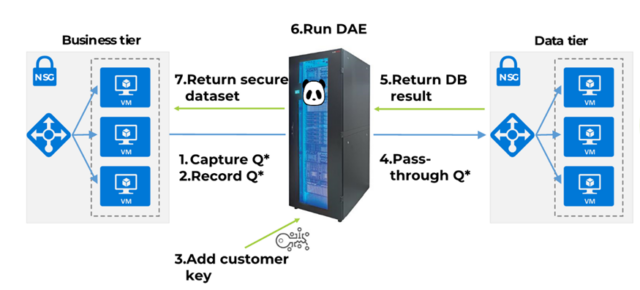About the project
ProSTRAT-AI project is designed to address the European Market demand for a test to guide intervention for prostate cancer (PCa).
Background
PCa is one of the most common malignancies as ~1 in 7 men are expected to disease during their lifetime, imposing a significant social and economic burden.
ProSTRAT-AI is based on the hypothesis that a multiparametric model based on Artificial Intelligence(AI), which can efficiently integrate different sources of existing clinical, omics, demographic, and imaging datasets with proven diagnostic and/or prognostic value is expected to overcome the challenges associated with PCa heterogeneity will deliver the urgently required guidance on PCa management.
ProSTRAT-AI is based on the hypothesis that a multiparametric model based on Artificial Intelligence(AI), which can efficiently integrate different sources of existing clinical, omics, demographic, and imaging datasets with proven diagnostic and/or prognostic value is expected to overcome the challenges associated with PCa heterogeneity will deliver the urgently required guidance on PCa management.
For ~45% of PCa cases that are slow-progressing and do not require immediate treatment, active surveillance (AS) is endorsed. However, non-invasive tests that accurately detect clinically significant PCa and can guide patients who need definite treatment and/or exit the AS scheme are not yet implemented in clinics.
Clinical Concept

Study outline

Ultimate Goal of ProSTRAT-AI
Aim
Establishment and commercialization of an AI-based diagnostic test product to discriminate significant(i.e. life-threatening disease in the absence of treatment) and insignificant (i.e. unlikely to progress in the absence of treatment) PCa.
Output
An AI-based diagnostic test to better address the biological variability of PCa, allowing for improved disease management and guiding intervention.
Implementation
Advanced Multi-Modal AI for Comprehensive Prostate Cancer Diagnosis
ProSTRAT-AI focuses on multi-modal AI models to extend feature collection and processing across all spectrums of data points within ProSTRAT-AI data sources (imaging data, CE-MS-based omics, clinical and demographic).
Our approach to multi-modal AI models is based on generic AI architecture (PANDA) that ATMC developed in-house, paired with anonymization and privacy components.
This type of architecture focuses on multiple models working jointly and combined models encompassing different inputs over the same data points (like numerical as well as a visual representation of urinary profiles from CE-MS) to provide results as an ensemble while still having internal recommendation processing paths to minimize time and energy required for inference (i.e., scoring of input data based on trained models)
Our approach to multi-modal AI models is based on generic AI architecture (PANDA) that ATMC developed in-house, paired with anonymization and privacy components.
This type of architecture focuses on multiple models working jointly and combined models encompassing different inputs over the same data points (like numerical as well as a visual representation of urinary profiles from CE-MS) to provide results as an ensemble while still having internal recommendation processing paths to minimize time and energy required for inference (i.e., scoring of input data based on trained models)


Implementation
Secure and Efficient Data Anonymization with PANDA Methodology
PrivAcy 'N’ DAta (PANDA) methodology. PANDA, a proprietary technology developed by ATMC, is a system for anonymization that adheres to several requirements for data management systems, like:
a) security strong enough to make any tracing of masked (anonymized) values back to original sensitive information hard enough or impossible,
b) speed capable of working online (real-time mode, data in motion),
c) supported algorithms able to anonymize/generate/format all the different value types of the dataset,
d) connectivity to various databases and
e) resilience.
a) security strong enough to make any tracing of masked (anonymized) values back to original sensitive information hard enough or impossible,
b) speed capable of working online (real-time mode, data in motion),
c) supported algorithms able to anonymize/generate/format all the different value types of the dataset,
d) connectivity to various databases and
e) resilience.
Mobile app
User-Friendly Mobile Application for ProSTRAT-AI Results and Guidance
A mobile application to host and display ProSTRAT-AI related results, surveys, and recommendations in a user-friendly manner will be also developed to help PCa patients in the test use. This is a secondary ProSTRAT-AI product that is planned to be launched (through Google/ Apple stores etc).

Project Implementation & Timeline
The implementation of ProSTRAT-AI is meticulously planned and executed through a series of well-defined work packages (WPs) over a 36-month period. Each work package focuses on critical aspects of the project, from effective communication and data management to advanced AI model development and commercialization. Our structured approach ensures seamless collaboration, rigorous data privacy, comprehensive dataset curation, and robust AI model validation.
The objective of WP1 is to ensure effective communication between partners and information exchange within the ProSTRAT-AI Consortium. Within WP1, there are the following expected outcomes:
Establishment of a management structure
Organization of project meetings
Submission of reports and financial statements
Management of ethical and legal obligations
Organization of sample and data exchange
Set up a Data Management Plan (DMP)
The objective of WP2 is to develop the ProSTRAT-AI data space for data sharing and curation, and the tools for data analyses and modeling. Within WP2, there are the following expected outcomes:
Application of advanced cybersecurity, data privacy, and protection measures
Developing a data space and its soft infrastructure
Development of digiture data privacy, and protection
Integration of the digital tools in the data space and their deployment to the use cases
The objective of WP3 is to gather, align and curate existing datasets, available through MOS. Within WP3, there are the following expected
outcomes:
outcomes:
Collection and curation of clinical and follow-up datasets
Integration of epidemiological datasets
Collection and curation of omics
Collection and curation of imaging datasets
The primary objective of WP4 is to construct and validate models utilizing innovative AI-based algorithms. Within WP4, there are the following expected outcomes:
Exploration of initial patient datasets to confirm feature relevance
Development of autonomous and adaptable learning models, which allow numerous entities to train AI models in a trusted & secured way
Clinical validation of the optimal AI-based model
Pre-analytical validation of the omics platform in terms of stability, precision, and repeatability
Within WP5, the objective is to launch a prototype of the “ProSTRAT-AI Test” for discrimination between significant and insignificant prostate cancer. Within WP5, the following activities are foreseen:
Development of a ready-to-use demonstrator of the diagnostic test kit. The test kit will be comprised of standardized sampling materials and a detailed user manual guiding urine collection, storage, and shipment
Development of ProSTRAT-AI mobile application
Integration of ProSTRAT-AI mobile app with multiparametric AI model to assist patient survey collection, store all necessary information about ProSTRAT-AI test, provide guidance for urine collection and sampling, and display the test results and other treatment information
Within WP6, the objective is to provide a solid foundation for the successful implementation of the ProSTRAT-AI test. Within WP6, there are the
following expected outcomes:
following expected outcomes:
The development of an implementation strategy
Raise awareness of the ProSTRAT-AI test and project and its role in health promotion and improved management of PCa patients
Disseminate novel findings
Implement and maintain a website
Assure proper handling of IPR